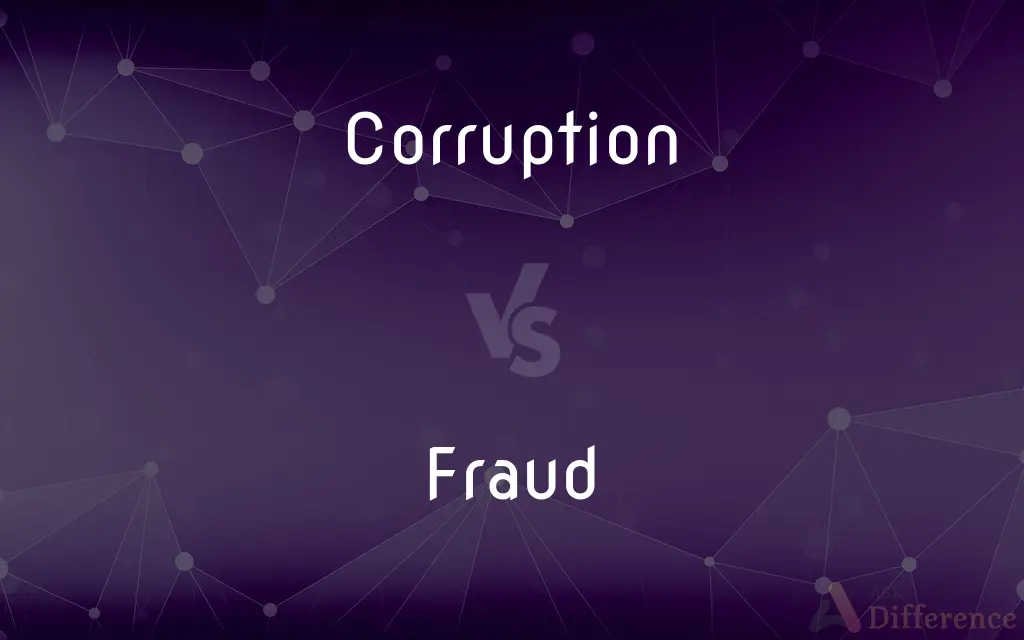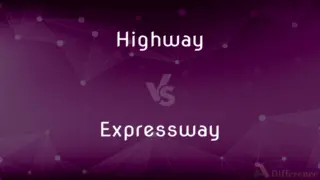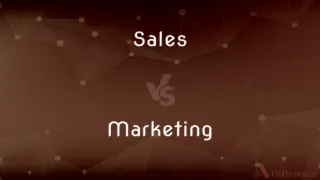Corruption vs. Fraud — What's the Difference?
By Urooj Arif & Fiza Rafique — Updated on March 6, 2024
Corruption involves the misuse of power for personal gain, often affecting public interests, while fraud is a specific act of deception for personal or financial gain.

Difference Between Corruption and Fraud
Table of Contents
ADVERTISEMENT
Key Differences
Corruption is a broad term that encompasses unethical behaviors by individuals in power, using their positions to acquire personal benefits, often at the public's expense. It can manifest in various forms, including bribery, nepotism, and embezzlement. Whereas fraud specifically refers to the act of deceit or misrepresentation intended to result in financial or personal gain. It's a deliberate act that can be conducted by individuals or organizations without necessarily holding a position of power.
Corruption often requires a certain level of authority or influence to be effectively executed, as it typically involves the manipulation of public or organizational roles and resources. On the other hand, fraud can be committed by anyone, regardless of their status or position, and focuses solely on the act of deceiving others to gain an advantage.
While corruption can have a wide-ranging impact on society, including undermining trust in public institutions, eroding the quality of life, and distorting public policies, fraud primarily affects the immediate victims of the deceptive acts, potentially leading to financial losses or compromised personal data.
Corruption and fraud both undermine ethical standards and legal norms, but the mechanisms and outcomes of these actions differ. Corruption is more associated with the abuse of power by those in positions of authority, while fraud is characterized by the act of deception to gain an advantage.
Despite their differences, both corruption and fraud are detrimental to societal welfare and economic stability. They erode trust in institutions, hinder economic development, and can lead to significant legal and social consequences for the individuals involved.
ADVERTISEMENT
Comparison Chart
Definition
Misuse of power for personal gain.
Deception for personal or financial gain.
Key Elements
Abuse of power, personal gain, public interest.
Deception, financial/personal advantage.
Actors
Typically involves individuals in power.
Can be committed by anyone.
Impact
Affects society and public institutions.
Primarily affects individual victims.
Legal Consequences
Can lead to charges of bribery, embezzlement.
Involves charges of deception, theft.
Compare with Definitions
Corruption
Moral perversion; depravity.
The scandal exposed the corruption within the organization.
Fraud
Any act, expression, omission, or concealment calculated to deceive another to his or her disadvantage.
The fraudulent scheme involved multiple businesses.
Corruption
Perversion of integrity.
Corruption in the legal system undermines public trust.
Fraud
A person who makes deceitful pretenses.
The fraud was eventually caught and prosecuted.
Corruption
The act of corrupting or of impairing integrity, virtue, or moral principle.
Corruption among public officials is a significant concern globally.
Fraud
The quality of being fraudulent.
His fraudulence was exposed, leading to his arrest.
Corruption
The act of corrupting or state of being corrupt.
The investigation revealed corruption at the highest levels of government.
Fraud
Misrepresentation intended to result in financial or personal gain.
She was a victim of credit card fraud.
Corruption
Corruption, as it is defined by the World Bank, is a form of dishonesty or a criminal offense which is undertaken by a person or an organization which is entrusted with a position of authority, in order to acquire illicit benefits or abuse power for one's private gain. Corruption may involve many activities which include bribery and embezzlement, and it may also involve practices which are legal in many countries.
Fraud
A deception deliberately practiced to secure unfair or unlawful gain.
The company was accused of committing fraud to boost its profits.
Corruption
The act or process of corrupting.
Fraud
In law, fraud is intentional deception to secure unfair or unlawful gain, or to deprive a victim of a legal right. Fraud can violate civil law (e.g., a fraud victim may sue the fraud perpetrator to avoid the fraud or recover monetary compensation) or criminal law (e.g., a fraud perpetrator may be prosecuted and imprisoned by governmental authorities), or it may cause no loss of money, property, or legal right but still be an element of another civil or criminal wrong.
Corruption
The state of being corrupt.
Fraud
A deception practiced in order to induce another to give up possession of property or surrender a right.
Corruption
Decay; rot.
Fraud
A piece of trickery; a trick.
Corruption
The act of corrupting or of impairing integrity, virtue, or moral principle; the state of being corrupted or debased; loss of purity or integrity
Fraud
One that defrauds; a cheat.
Corruption
The act of corrupting or making putrid, or state of being corrupt or putrid; decomposition or disorganization, in the process of putrefaction; putrefaction; deterioration.
Fraud
One who assumes a false pose; an impostor.
Corruption
The product of corruption; putrid matter.
Fraud
(law) The crime of stealing or otherwise illegally obtaining money by use of deception tactics.
Corruption
The decomposition of biological matter.
Fraud
Any act of deception carried out for the purpose of unfair, undeserved and/or unlawful gain.
Corruption
Unethical administrative or executive practices (in government or business), including bribery (offering or receiving bribes), conflicts of interest, nepotism, and so on.
Fraud
The assumption of a false identity to such deceptive end.
Corruption
(computing) The destruction of data by manipulation of parts of it, either by deliberate or accidental human action or by imperfections in storage or transmission media.
Fraud
A person who performs any such trick.
Corruption
The act of changing, or of being changed, for the worse; departure from what is pure, simple, or correct.
A corruption of style
Corruption of innocence
Fraud
(obsolete) A trap or snare.
Corruption
(usage prescription) A nonstandard form of a word, expression, or text, assigned a value judgment as being debased, especially when resulting from misunderstanding, transcription error, or mishearing.
Fraud
(obsolete) To defraud
Corruption
Something originally good or pure that has turned evil or impure; a perversion.
Fraud
Deception deliberately practiced with a view to gaining an unlawful or unfair advantage; artifice by which the right or interest of another is injured; injurious stratagem; deceit; trick.
If success a lover's toil attends,Few ask, if fraud or force attained his ends.
Corruption
The act of corrupting or making putrid, or state of being corrupt or putrid; decomposition or disorganization, in the process of putrefaction; putrefaction; deterioration.
The inducing and accelerating of putrefaction is a subject of very universal inquiry; for corruption is a reciprocal to "generation".
Fraud
An intentional perversion of truth for the purpose of obtaining some valuable thing or promise from another.
Corruption
The product of corruption; putrid matter.
Fraud
A trap or snare.
To draw the proud King Ahab into fraud.
Corruption
The act of corrupting or of impairing integrity, virtue, or moral principle; the state of being corrupted or debased; loss of purity or integrity; depravity; wickedness; impurity; bribery.
It was necessary, by exposing the gross corruptions of monasteries, . . . to exite popular indignation against them.
They abstained from some of the worst methods of corruption usual to their party in its earlier days.
Fraud
Intentional deception resulting in injury to another person
Corruption
Lack of integrity or honesty (especially susceptibility to bribery); use of a position of trust for dishonest gain
Fraud
A person who makes deceitful pretenses
Corruption
In a state of progressive putrefaction
Fraud
Something intended to deceive; deliberate trickery intended to gain an advantage
Corruption
Decay of matter (as by rot or oxidation)
Corruption
Moral perversion; impairment of virtue and moral principles;
The luxury and corruption among the upper classes
Moral degeneracy followed intellectual degeneration
Its brothels; its opium parlors; its depravity
Corruption
Destroying someone's (or some group's) honesty or loyalty; undermining moral integrity;
Corruption of a minor
The big city's subversion of rural innocence
Corruption
Inducement (as of a public official) by improper means (as bribery) to violate duty (as by commiting a felony);
He was held on charges of corruption and racketeering
Common Curiosities
How do corruption and fraud differ?
Corruption involves the abuse of power by those in authority for personal benefit, whereas fraud is any act of deception for gain.
What are the consequences of corruption?
Corruption can lead to a loss of public trust, economic instability, and social inequality.
What is corruption?
Corruption is the misuse of entrusted power for personal gain.
Can fraud occur within the context of corruption?
Yes, fraud can be a component of corrupt activities, especially in schemes involving deceit for financial gain.
Are corruption and fraud illegal?
Both corruption and fraud are illegal and can result in severe legal penalties.
Who investigates corruption and fraud?
Specialized government agencies, anti-corruption bodies, and law enforcement.
What is fraud?
Fraud is the act of deceiving or misleading others for financial or personal advantage.
What are the consequences of fraud?
Fraud typically results in financial loss for the victim and can undermine trust in financial institutions.
Is corruption more prevalent in certain areas or sectors?
Yes, corruption is often more prevalent in areas with weak institutions, lack of transparency, and high levels of bureaucratic control.
Are there any effective measures to prevent fraud?
Effective measures include robust verification processes, education on common fraud schemes, and strong legal repercussions for perpetrators.
How do corruption and fraud affect the economy?
They deter investment, increase costs, and can lead to inefficient use of resources.
How do societies combat corruption and fraud?
Through stringent laws, transparent systems, and public awareness.
What impact does corruption have on public services?
It can lead to the deterioration of quality, accessibility, and fairness of public services.
What role does transparency play in preventing corruption and fraud?
Transparency helps to ensure accountability, making it harder for corrupt and fraudulent activities to occur.
Can a person be guilty of both corruption and fraud?
Yes, individuals can engage in acts that are both corrupt and fraudulent.
Share Your Discovery

Previous Comparison
Highway vs. Expressway
Next Comparison
Sales vs. MarketingAuthor Spotlight
Written by
Urooj ArifUrooj is a skilled content writer at Ask Difference, known for her exceptional ability to simplify complex topics into engaging and informative content. With a passion for research and a flair for clear, concise writing, she consistently delivers articles that resonate with our diverse audience.
Co-written by
Fiza RafiqueFiza Rafique is a skilled content writer at AskDifference.com, where she meticulously refines and enhances written pieces. Drawing from her vast editorial expertise, Fiza ensures clarity, accuracy, and precision in every article. Passionate about language, she continually seeks to elevate the quality of content for readers worldwide.
















































